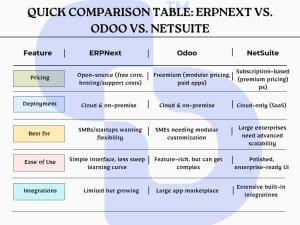Choosing the right ERP (Enterprise Resource Planning) system is one of the most critical decisions for growing businesses. The wrong fit can drain budgets and stall operations, while the right one fuels efficiency and scalability. Three of the most Googled options—ERPNext, Odoo, and NetSuite—often land on the same shortlist. But how do they really compare? Let’s break it down.

ERPNext: The Open-Source Challenger
Best for: Startups, SMBs, and cost-conscious companies.
ERPNext is a fully open-source ERP. That means no licensing fees—just hosting and support costs. It covers core business processes like accounting, inventory, HR, CRM, and manufacturing.
Pros:
- Budget-friendly with no vendor lock-in
- Customizable with access to source code
- Strong community support
Cons:
- Fewer third-party integrations than Odoo or NetSuite
- Limited advanced features for complex enterprises
If you want control and affordability without heavy licensing costs, ERPNext is a solid pick.
Odoo: The Modular All-Rounder
Best for: SMEs looking for flexibility and a wide app ecosystem.
Odoo offers a freemium model: basic apps are free, while premium modules require payment. Its biggest advantage is modularity—you can start with essentials and add apps as your business grows.
Pros:
- Huge app marketplace
- Flexible, scalable for different industries
- Works both on-premise and in the cloud
Cons:
- Costs can pile up as you add modules
- Requires technical expertise for customization
Odoo strikes a balance between affordability and scalability, making it a favorite for small to mid-sized businesses.
NetSuite: The Enterprise Powerhouse
Best for: Large enterprises with complex needs.
Owned by Oracle, NetSuite is a premium SaaS ERP designed for businesses that demand advanced scalability, global compliance, and deep integrations.
Pros:
- Cloud-native with high reliability
- Rich built-in features for finance, supply chain, and e-commerce
- Strong enterprise-level support
Cons:
- Premium pricing, not budget-friendly
- Limited flexibility for self-hosting
- Longer implementation cycles
For enterprises prioritizing global operations, compliance, and industry-specific solutions, NetSuite stands out as the go-to.
Which ERP Should You Choose?
- Choose ERPNext if you want a free, open-source ERP with strong core features and lower TCO (total cost of ownership).
- Choose Odoo if you want modularity, flexibility, and room to scale as your business grows.
- Choose NetSuite if you need an enterprise-grade SaaS solution with global capabilities.
Final Thoughts
There’s no one-size-fits-all ERP. Your best choice depends on your business size, budget, industry, and technical resources.
👉 If you’re a startup or SMB: ERPNext is the most cost-effective.
👉 If you’re an SME needing flexibility, Odoo offers the best modular approach.
👉 If you’re a large enterprise: NetSuite delivers enterprise-level depth and scalability.
Before deciding, map out your requirements, budget, and growth plans. Then, test demos or trials—because the best ERP is the one that aligns with your business strategy.
Request a Demo with DataValue Solutions Today and make your decision.
If you need more details, visit our website
